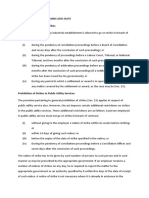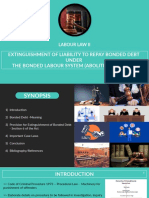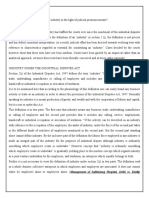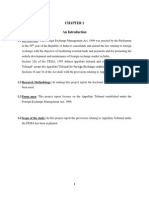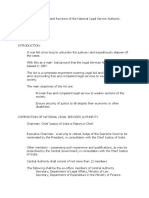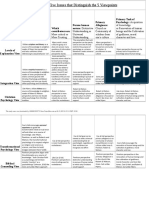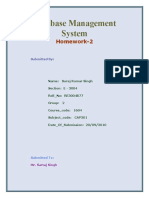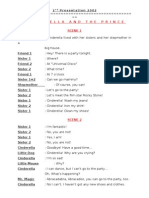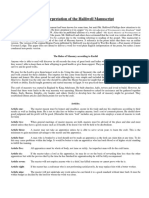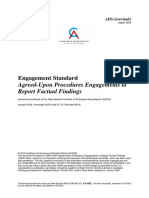0 ratings0% found this document useful (0 votes)
908 viewsStrike Lock Out
Strike Lock Out
Uploaded by
Mishika PanditaThe document discusses strikes and lockouts under Indian labor law. It provides definitions and discusses:
1) Strikes and lockouts are weapons used by workers and employers respectively in collective bargaining, but are regulated by law.
2) The law prohibits strikes and lockouts during conciliation proceedings or within 2 months of their conclusion to allow dispute resolution.
3) Strikes and lockouts are considered illegal if they violate provisions around required notice periods, timing or continue despite a prohibition order. The rights to strike and lockout are subject to limitations under the law.
Copyright:
© All Rights Reserved
Available Formats
Download as PDF, TXT or read online from Scribd
Strike Lock Out
Strike Lock Out
Uploaded by
Mishika Pandita0 ratings0% found this document useful (0 votes)
908 views23 pagesThe document discusses strikes and lockouts under Indian labor law. It provides definitions and discusses:
1) Strikes and lockouts are weapons used by workers and employers respectively in collective bargaining, but are regulated by law.
2) The law prohibits strikes and lockouts during conciliation proceedings or within 2 months of their conclusion to allow dispute resolution.
3) Strikes and lockouts are considered illegal if they violate provisions around required notice periods, timing or continue despite a prohibition order. The rights to strike and lockout are subject to limitations under the law.
Original Title
STRIKE LOCK OUT
Copyright
© © All Rights Reserved
Available Formats
PDF, TXT or read online from Scribd
Share this document
Did you find this document useful?
Is this content inappropriate?
The document discusses strikes and lockouts under Indian labor law. It provides definitions and discusses:
1) Strikes and lockouts are weapons used by workers and employers respectively in collective bargaining, but are regulated by law.
2) The law prohibits strikes and lockouts during conciliation proceedings or within 2 months of their conclusion to allow dispute resolution.
3) Strikes and lockouts are considered illegal if they violate provisions around required notice periods, timing or continue despite a prohibition order. The rights to strike and lockout are subject to limitations under the law.
Copyright:
© All Rights Reserved
Available Formats
Download as PDF, TXT or read online from Scribd
Download as pdf or txt
0 ratings0% found this document useful (0 votes)
908 views23 pagesStrike Lock Out
Strike Lock Out
Uploaded by
Mishika PanditaThe document discusses strikes and lockouts under Indian labor law. It provides definitions and discusses:
1) Strikes and lockouts are weapons used by workers and employers respectively in collective bargaining, but are regulated by law.
2) The law prohibits strikes and lockouts during conciliation proceedings or within 2 months of their conclusion to allow dispute resolution.
3) Strikes and lockouts are considered illegal if they violate provisions around required notice periods, timing or continue despite a prohibition order. The rights to strike and lockout are subject to limitations under the law.
Copyright:
© All Rights Reserved
Available Formats
Download as PDF, TXT or read online from Scribd
Download as pdf or txt
You are on page 1of 23
STRIKE & LOCK OUT
• Strikes and lock-outs are the two weapons in the hands
of workers and employers respectively, which they can
use to press their viewpoints in the process of
collective bargaining.
• The Industrial Disputes Act, 1947 does not grant an
unrestricted right of strike or lock-out. Under Section
10(3) and Section 10A(4A), the Government is
empowered to issue order for prohibiting continuance
of strike or lock-out.
• Sections 22 and 23 make further provisions restricting
the commencement of strikes and lock-outs.
Section 2 (I)
• “lock-out” means the temporary closing of a
place of employment or the suspension of
work, or the refusal by an employer to
continue to employ any number of persons
employed by him.
General Labour Unlon (Red Flag) vs B.
V. Chavan And Ors
• Supreme Court of India expressed
"Imposing and continuing a lockout deemed
to be illegal under the Act is an unfair labour
practice."
Management Of Kairbetta vs
Rajamanickam And Others
• Supreme Court of India observed as follows;
"Just as a strike is a weapon available to the employees for
enforcing their industrial demands, a lockout is a weapon available
to the employer to persuade by a coercive process the employees
to see his point of view and to accept his demands. In the struggle
between capital and labour, the weapon of strike Is available to
labour and is often used by it, so is the weapon of lockout available
to the employer and can be used by him. The use of both the
weapons by the respective parties Must, however, be subject to the
relevant provisions of the I D Act. It deals with strikes and lockouts
clearly brings out the antithesis between the two weapons and the
limitations subject to which both of them must be exercised."
Chemicals & Fibres Of India Ltd vs D.
G. Bhoir & Ors
• We; are therefore of opinion that the proper
point of view from which to look at the
problem is to give limited application to the
fact of the introduction of section 2A in
the Industrial Disputes Act and to hold that
the pendency of a dispute between an
individual workman as such and the employer
does not attract the provisions of section 23.
• Our attention is drawn to the contrast between clause (c)
and (d) of section 23 and it is argued that while under
clause (c) there is a limitation in respect of matters in
relation to which there cannot be a strike, there is no such
limitation under clause (b) and therefore clause (b)
provides a blanket ban on strikes if proceedings are
pending. It is not possible to give such an extended
meaning to that provision. As we have pointed out, even in
respect of clause (b) some limitation should be read
confining it to the parties to the proceedings either actually
or constructively, as in the case of a union espousing the
cause of an individual workman. Nobody, for instance, can
argue that because proceedings are pending in relation to
one industrial establishment owned by an employer, there
can be no strike in another industrial establishment owned
by that employer because there are no words of limitation
in clause.
STRIKE SECTION 2 (Q)
• Strike is one of the oldest and the most effective weapons
of labour in its struggle with capital for securing economic
justice. The basic strength of a strike lies in the labours
privilege to quit work and thus brings a forced
readjustment of conditions of employment.
• It owes its origin to old English words Striken to go. In
common parlance it means hit, impress, occur to, to quit
work on a trade dispute. The latter meaning is traceable to
1768. Later on it varied to strike of work. The composite
idea of quitting work or withdrawal of work as a coercive
act could be gathered in the use of word as a verb as well
as adjective. The definition and use of the word strike has
been undergoing constant transformation around the basic
concept of stoppage of work or putting of work by
employees in their economic struggle with capital.
• Section 2 (q) “strike” means a cessation of
work by a body of persons employed in any
industry acting in combination, or a concerted
refusal, or a refusal under a common
understanding, of any number of persons who
are or have been so employed to continue to
work or to accept employment;
Essential requirements for the
existence of a strike:
• (1) There must be cessation of work.
(2) The cessation of work must be by a body of persons
employed in any industry;
(3) The strikers must have been acting in combination;
(4) The strikers must be working in any establishment
which can be called industry within the meaning of Section
2(j); or
(5) There must be a concerted refusal; or
(6) Refusal under a common understanding of any number
of persons who are or have been so employed to continue
to work or to accept employment;
(7) They must stop work for some demands relating to
employment, non-employment or the terms of
employment or the conditions of labour of the workmen.
(i) Prohibition of strikes and lock-outs
in public utility service
• Section 22 (1) No person employed in a public utility service shall
go on strike in breach of contract.
• (a) without giving to the employer notice of strike, as hereinafter
provided, within six weeks before striking, i.e., from the date of the
notice to the date of strike a period of six weeks should not have
elapsed; or
• (b) within 14 days of giving of such notice, i.e., a period of 14 days
must have elapsed from the date of notice to the date of strike; or
• (c) before the expiry of the date of strike specified in any such
notice as aforesaid, i.e., the date specified in the notice must have
expired on the day of striking; or
• (d) during the pendency of any conciliation proceedings before a
conciliation officer and seven days after the conciliation of such
proceedings.
Dharam Singh Rajput v. Bank of India,
Bombay
• Right to Strike is to be exercised after
complying with certain conditions regarding
service of notice and also after exhausting
intermediate and salutary remedy of
conciliation proceedings.
State of Bihar v. Deodar Jha
• Section 22 provides for following additional
safeguards for the smooth and uninterrupted
running of public utility services and to
obviate the possibility of inconvenience to the
general public and society.
• Section 22 (2) No employer carrying on any public
utility service shall lock-out any of his workmen:
• (a) without giving them notice of lock-out as
hereinafter provided within six weeks before locking-
out; or
• (b) within 14 days of giving such notice; or
• (c) before the expiry of the date of lock-out specified in
any such notice as aforesaid; or
• (d) during the pendency of any conciliation
proceedings before a Conciliation Officer and 7 days
after the conciliation of such proceedings.
• (3) The notice of lock-out or strike under this
Section shall not be necessary where there is
already in existence a strike or, as the case
may be, lock-out in the public utility service,
but the employer shall send intimation of such
lock-out or strike on the day on which it is
declared, to such authority as may be
specified by the appropriate Government
either generally or for a particular area or for a
particular class of public utility services.
• (4) The notice of strike referred to in Section 22(1) shall be
given by such number of persons to such person or persons
and in such manner as may be prescribed.
• (5) The notice of lock-out referred to in Section 22(2) shall
be given in such manner as may be prescribed.
• (6) If on any day an employer receives from any persons
employed by him any such notices as are referred to in sub-
section (1) or gives to any persons employed by him any
such notices as are referred to in sub-section (2), he shall
within five days thereof report to the appropriate
Government or to such authority as that Government may
prescribe the number of such notices received or given on
that day. (Section 22)
(II)General prohibition of strikes and
lock-outs (section 23)
• No workman who is employed in any industrial establishment shall
go on strike in breach of contract and no employer of any such
workman shall declare a lock-out-
• (a) during the pendency of conciliation proceedings before a Board
and seven days after the conclusion of such proceedings;
• (b) during the pendency of proceedings before [a Labour Court,
Tribunal or National Tribunal] and two months after the conclusion
of such proceedings. (ommitted)
• [(bb) during the pendency of arbitration proceedings before an
arbitrator and two months after the conclusion of such
proceedings, where a notification has been issued under subsection
(3-A) of Section 10-A; or]
• (c) during any period in which a settlement or award is in operation
in respect of any of the matters covered by the settlement or
award.
(iii) Illegal strikes and lock-outs
(Section 24)
• (1) A strike or lock-out shall be illegal if:
• (i) it is commenced or declared in
contravention of Section 22 or Section 23; or
• (ii) It is continued in contravention of an order
made under Section 10(3) or Section 10A(4A).
• (2) Where a strike or lock-out in pursuance of an
industrial dispute has already commenced and is
in existence at the time of reference of the
dispute to a Board, an arbitrator, a Labour Court,
Tribunal or National Tribunal, the continuance of
such strike or lock-out shall not be deemed to be
illegal, provided that such strike or lock-out was
not at its commencement in contravention of the
provisions of this Act or the continuance thereof
was not prohibited under Section 10(3) or Section
10A(4A).
• (3) A lock-out declared in consequence of an
illegal strike or strike declared in consequence
of an illegal lock-out shall not be deemed to
be illegal. (Section 24)
(iv)Prohibition of financial aid to illegal
strikes and lock-outs (Section 25)
• No person shall knowingly expend or apply
any money in direct furtherance or support of
any illegal strike or lock-out.
(v)Penalty for illegal strikes and lock-
outs (Section 26)
• (1) Any workman who commences, continues or
otherwise acts in furtherance of, a strike which is illegal
under this Act, shall be punishable with imprisonment
for a term which may extend to one month, or with
fine which may extend to fifty rupees, or with both.
• (2) Any employer who commences, continues, or
otherwise acts in furtherance of a lock-out which is
illegal under this Act, shall be punishable with
imprisonment for a term which may extend to one
month, or with fine which may extend to one thousand
rupees, or with both.
(vi)Penalty for instigation etc. (Section
27)
• Any person who instigates or incites others to
take part in, or otherwise acts in furtherance
of, a strike or lock-out which is illegal under
this Act, shall be punishable with
imprisonment for a term which may extend to
six months, or with fine which may extend to
one thousand rupees, or with both.
(vii)Penalty for giving financial aid to illegal
strikes and lock-outs (Section 28)
• Any person who knowingly expends or applies
any money in direct furtherance or support of
any illegal strike or lock-out shall be
punishable with imprisonment for a term
which may extend to six months, or with fine
which may extend to one thousand rupees, or
with both.
You might also like
- Bipartite ForumsDocument5 pagesBipartite ForumsIbban JavidNo ratings yet
- Allocable Surplus and Available SurplusDocument1 pageAllocable Surplus and Available SurplusRukhsar Khatun0% (1)
- Industrial Disputes Act 1947: Awards and SettlementDocument8 pagesIndustrial Disputes Act 1947: Awards and SettlementSamuel pereira100% (1)
- Strike, Lockout, LayoffDocument35 pagesStrike, Lockout, LayoffLakshmi Suresh75% (4)
- Amity University Rajasthan: Lock-Out Under Industrial Dispute ACT, 1947Document6 pagesAmity University Rajasthan: Lock-Out Under Industrial Dispute ACT, 1947Sahida ParveenNo ratings yet
- Prohibition of Strikes and Lock-Outs General Prohibition of StrikesDocument3 pagesProhibition of Strikes and Lock-Outs General Prohibition of StrikesFatema Vora0% (1)
- Damodaram Sanjivayya National Law University. Sabbavaram.: Subject:-Labour Law - I Topic: - Closure Under I.D. ActDocument32 pagesDamodaram Sanjivayya National Law University. Sabbavaram.: Subject:-Labour Law - I Topic: - Closure Under I.D. ActShaik Khaja Basha100% (1)
- Concept of Continuous Service' Under The Industrial Disputes Act, 1947Document10 pagesConcept of Continuous Service' Under The Industrial Disputes Act, 1947Ishika kanyalNo ratings yet
- IndustryDocument10 pagesIndustryMohit MalhotraNo ratings yet
- Rights and Liabilities of Trade UnionDocument2 pagesRights and Liabilities of Trade UnionIndrajit DuttaNo ratings yet
- Contractual Liability of The State 2Document14 pagesContractual Liability of The State 2Gulshan SinghNo ratings yet
- Salient Features of The Payment of Bonus ActDocument5 pagesSalient Features of The Payment of Bonus ActbudhnabamNo ratings yet
- Quod Ab Inito Non Valet in Tractu Temporis Non ConvalesscitDocument6 pagesQuod Ab Inito Non Valet in Tractu Temporis Non ConvalesscitCA Neelam Lalwani100% (2)
- Incoming and Outgoing PartnersDocument4 pagesIncoming and Outgoing PartnersBarakaNo ratings yet
- Power of Government To Refer Industrial Disputes For Adjudication: The Adjudication MachineryDocument5 pagesPower of Government To Refer Industrial Disputes For Adjudication: The Adjudication MachineryAbhishek PandeyNo ratings yet
- Will and CodicilDocument16 pagesWill and CodicilHarshit Malviya100% (1)
- Standing Orders Labour Law ProjectDocument12 pagesStanding Orders Labour Law ProjectMaaz Alam100% (1)
- Labour Law II - Extinguishment of Liability To Repay Bonded DebtDocument13 pagesLabour Law II - Extinguishment of Liability To Repay Bonded DebtSRILAKSHMI GHATENo ratings yet
- Penalties Under Trade Union ActDocument3 pagesPenalties Under Trade Union Actanshul071450% (2)
- Historical Development of Administrative LawDocument20 pagesHistorical Development of Administrative LawSARIKA100% (1)
- Abatement of LegaciesDocument8 pagesAbatement of LegaciesSyed Faisal HayatNo ratings yet
- PressurizationDocument19 pagesPressurizationadv_animeshkumar100% (3)
- Rights and Liabilities of A Registered Trade UnionDocument29 pagesRights and Liabilities of A Registered Trade UnionNamita LepchaNo ratings yet
- Employees' Compensation Act, 1923Document51 pagesEmployees' Compensation Act, 1923Diksha SoinNo ratings yet
- Authorities Under The Industrial Disputes ActDocument4 pagesAuthorities Under The Industrial Disputes ActLakshmi Narayan RNo ratings yet
- Section 40-Previous Judgments Relevant To Bar A Second Suit or TrailDocument3 pagesSection 40-Previous Judgments Relevant To Bar A Second Suit or TrailAditya Prakash VermaNo ratings yet
- Henry Viii Clause - Administrative LawDocument10 pagesHenry Viii Clause - Administrative Lawpsnraju4382100% (2)
- ProspectusDocument14 pagesProspectusSimran ChaudharyNo ratings yet
- Rule of Feeding The Grant by Estoppels (Section 43)Document11 pagesRule of Feeding The Grant by Estoppels (Section 43)AN HadNo ratings yet
- Salient Features of The CLA 1970Document1 pageSalient Features of The CLA 1970arsaban100% (1)
- CRPC Solved Problems - Comprehensive GuideDocument46 pagesCRPC Solved Problems - Comprehensive Guideashok5juneNo ratings yet
- Working Hours of AdultsDocument6 pagesWorking Hours of AdultsSunanda MohanNo ratings yet
- Introduction To Industrial JurisprudenceDocument25 pagesIntroduction To Industrial JurisprudenceRaju PantaNo ratings yet
- Making of Award and Termination of ProceedingsDocument11 pagesMaking of Award and Termination of ProceedingsNiti KaushikNo ratings yet
- Labour Law - Industrial Dispute MechanismDocument8 pagesLabour Law - Industrial Dispute MechanismAmogha GadkarNo ratings yet
- Lay OffDocument12 pagesLay OffHritikka KakNo ratings yet
- Classification of Public CorporationsDocument3 pagesClassification of Public Corporationsgaming zone67% (3)
- Analysis of Definition of IndustryDocument12 pagesAnalysis of Definition of IndustryAshwin Panicker100% (2)
- 2018LLB003 - Family Law - Semester 4 - Research Paper (Repaired)Document21 pages2018LLB003 - Family Law - Semester 4 - Research Paper (Repaired)Aishwarya BuddharajuNo ratings yet
- Industrial Dispute Vs Individual DisputeDocument32 pagesIndustrial Dispute Vs Individual DisputexiraaaNo ratings yet
- Appellate Tribunal Under FEMADocument12 pagesAppellate Tribunal Under FEMARadhikaMathuria100% (2)
- Concept of Social SecurityDocument8 pagesConcept of Social SecurityPrateek Mishra100% (1)
- Conditional LegislationDocument17 pagesConditional LegislationSARIKANo ratings yet
- Classification of Administrative ActionDocument15 pagesClassification of Administrative ActionnibandodkarNo ratings yet
- Labour Laws and Industrial Laws: A Project Report OnDocument14 pagesLabour Laws and Industrial Laws: A Project Report OnHanu Mittal100% (3)
- S.P. AnandDocument7 pagesS.P. AnandAniket Singh100% (1)
- BSA - AdmissionDocument11 pagesBSA - AdmissionHitanshi PandyaNo ratings yet
- Immunity From Criminal LiabilityDocument15 pagesImmunity From Criminal LiabilityDigvijay Singh100% (1)
- Composition of NLSADocument3 pagesComposition of NLSAateeshborole100% (1)
- Property Law Doctrine of Holding OverDocument12 pagesProperty Law Doctrine of Holding OverVaibhav Verma50% (4)
- Measure of Civil and Criminal Liability: S - jurisprudence-IIDocument20 pagesMeasure of Civil and Criminal Liability: S - jurisprudence-IIAvinash Sharma100% (1)
- Difference Between Session Trial and Warrant TrialDocument5 pagesDifference Between Session Trial and Warrant Trialsahil100% (1)
- Actus Dei Nemini Facit InjuriamDocument1 pageActus Dei Nemini Facit InjuriamAkhil SreenadhNo ratings yet
- Transfer by Ostensible Owner: Section 41Document28 pagesTransfer by Ostensible Owner: Section 41mehak khanNo ratings yet
- Natural Justice and Institutional DecisionsDocument6 pagesNatural Justice and Institutional DecisionsLMRP2 LMRP2100% (4)
- Administrative DirectionsDocument23 pagesAdministrative DirectionsSARIKA100% (1)
- Employees State Insurance CorporationDocument3 pagesEmployees State Insurance CorporationAdan Hooda100% (1)
- Strike and LockoutDocument21 pagesStrike and LockoutVj KashyapNo ratings yet
- StrikeDocument4 pagesStrikeAshwina NamtaNo ratings yet
- Strikes and LockoutDocument37 pagesStrikes and LockoutRajat MananNo ratings yet
- Insolvency Resolution and Liquidation For Corporate PersonsDocument12 pagesInsolvency Resolution and Liquidation For Corporate PersonsMishika PanditaNo ratings yet
- 8/april / Lecture Notes Historical Background and Structure of Insolvency and Bankruptcy Code, 2016Document10 pages8/april / Lecture Notes Historical Background and Structure of Insolvency and Bankruptcy Code, 2016Mishika PanditaNo ratings yet
- 7/april/2020 Insolvency Code ContinuesDocument11 pages7/april/2020 Insolvency Code ContinuesMishika PanditaNo ratings yet
- Section 6 PDFDocument2 pagesSection 6 PDFMishika PanditaNo ratings yet
- Combinations: Advocates & Solicitors Delhi - Gurgaon - Mumbai - Bangalore - HyderabadDocument23 pagesCombinations: Advocates & Solicitors Delhi - Gurgaon - Mumbai - Bangalore - HyderabadMishika PanditaNo ratings yet
- Insolvency and Bankruptcy CodeDocument13 pagesInsolvency and Bankruptcy CodeMishika PanditaNo ratings yet
- Env Law Enotes 3Document9 pagesEnv Law Enotes 3Mishika PanditaNo ratings yet
- Env Law Enotes 2Document20 pagesEnv Law Enotes 2Mishika PanditaNo ratings yet
- Types Right To StrikeDocument17 pagesTypes Right To StrikeMishika Pandita100% (1)
- Prevention Settlement of IDDocument14 pagesPrevention Settlement of IDMishika PanditaNo ratings yet
- Prevention and Settlement 2Document19 pagesPrevention and Settlement 2Mishika PanditaNo ratings yet
- Procedure For Investigation of Combinations - Competition Act - 2002 - Bare Acts - Law Library - AdvocateKhojDocument1 pageProcedure For Investigation of Combinations - Competition Act - 2002 - Bare Acts - Law Library - AdvocateKhojMishika PanditaNo ratings yet
- Unfair Labour PracticesDocument16 pagesUnfair Labour PracticesMishika Pandita0% (1)
- Section 5 in The Competition Act - 2002Document2 pagesSection 5 in The Competition Act - 2002Mishika PanditaNo ratings yet
- Regulation of Combinations Under The Competition Law IpleadersDocument6 pagesRegulation of Combinations Under The Competition Law IpleadersMishika PanditaNo ratings yet
- Strategic Management - Theory Mastering Strategy - Art and ScienceDocument6 pagesStrategic Management - Theory Mastering Strategy - Art and ScienceFLORENCE DE CASTRONo ratings yet
- Edwardian PeriodDocument14 pagesEdwardian PeriodJoshee Mgdn BalucanNo ratings yet
- Education British English TeacherDocument4 pagesEducation British English TeacherAlice FewingsNo ratings yet
- 02 Installing and ConfiguringDocument52 pages02 Installing and ConfiguringJagdish ModiNo ratings yet
- Notes - Mid-Term BreakDocument7 pagesNotes - Mid-Term BreakLindie Van der MerweNo ratings yet
- 5S Basic TrainingDocument15 pages5S Basic TrainingShams ShabahatNo ratings yet
- The Insider - Movie Review From The Perspective of Business EthicsDocument2 pagesThe Insider - Movie Review From The Perspective of Business EthicslksgluceNo ratings yet
- Clement of Alexandria, Study in Christian Mysticism VOL 2 R. B. TollintonDocument372 pagesClement of Alexandria, Study in Christian Mysticism VOL 2 R. B. TollintonWaterwind100% (1)
- Music 10 - Q1 - Module1aDocument19 pagesMusic 10 - Q1 - Module1aJaspher PayagNo ratings yet
- ISO 9001:2015: The Evolution and Convergence of Quality Management and Knowledge Management For Competitive AdvantageDocument17 pagesISO 9001:2015: The Evolution and Convergence of Quality Management and Knowledge Management For Competitive AdvantageAndrew KapraunNo ratings yet
- Marx's Capital and Kafka's The MetamorphosisDocument3 pagesMarx's Capital and Kafka's The MetamorphosisEric RilezNo ratings yet
- Media Law AssignmentDocument6 pagesMedia Law Assignmentriyanriyaz012No ratings yet
- Week 1-3 - Risk ModelsDocument61 pagesWeek 1-3 - Risk ModelsParita PanchalNo ratings yet
- Psychology&Christianity 5 ViewpointsDocument2 pagesPsychology&Christianity 5 ViewpointsSarah100% (2)
- Database Management System: Homework-2Document19 pagesDatabase Management System: Homework-2Suraj Singh100% (2)
- History-Taking & Physical Examination by DR Samer Abu EidehDocument48 pagesHistory-Taking & Physical Examination by DR Samer Abu EidehAbdullah MatarNo ratings yet
- 2nd Presentation Cinderella and The PrinceDocument3 pages2nd Presentation Cinderella and The PrinceRallia SaatsoglouNo ratings yet
- NP Coban2 - Sample TestDocument4 pagesNP Coban2 - Sample TestHồ Thị Thu AnNo ratings yet
- BibliographyDocument12 pagesBibliographyMohammad AliNo ratings yet
- An Interpretation of The Halliwell ManuscriptDocument4 pagesAn Interpretation of The Halliwell ManuscriptMashae Mcewen100% (1)
- LSS Benefits of Kaizen To Business Excellence Evidence From A Case Study 2169 0316 1000251 (3197)Document15 pagesLSS Benefits of Kaizen To Business Excellence Evidence From A Case Study 2169 0316 1000251 (3197)Dasa ShelkNo ratings yet
- Math Assignment - FractionsDocument10 pagesMath Assignment - Fractionsapi-358031609No ratings yet
- Video Encoding and Ripping X264 SettingsDocument1 pageVideo Encoding and Ripping X264 SettingsVijaySharmaNo ratings yet
- Report Orumana CSDocument11 pagesReport Orumana CSAnonymous dEMsBG100% (1)
- Lesson - 2 - Rizal Life and WorksDocument10 pagesLesson - 2 - Rizal Life and WorksanjjfernndNo ratings yet
- Job Performance and Turnover: A Review and Meta-AnalysisDocument30 pagesJob Performance and Turnover: A Review and Meta-AnalysisPedro Alberto Herrera LedesmaNo ratings yet
- Belgica vs. Ochoa Case DigestDocument2 pagesBelgica vs. Ochoa Case DigestTynny Roo BelduaNo ratings yet
- SPUP 2 Systematic Review and MetaanalysisDocument41 pagesSPUP 2 Systematic Review and MetaanalysispachayilstephanoseshintoNo ratings yet
- APS1 Revised Standard FinalDocument31 pagesAPS1 Revised Standard Finalhaduken0% (1)
- Abu Dhabi Cathedral, St. Gregorios of Parumala Intercessory PrayerDocument15 pagesAbu Dhabi Cathedral, St. Gregorios of Parumala Intercessory PrayerJohn Abraham JamesNo ratings yet





